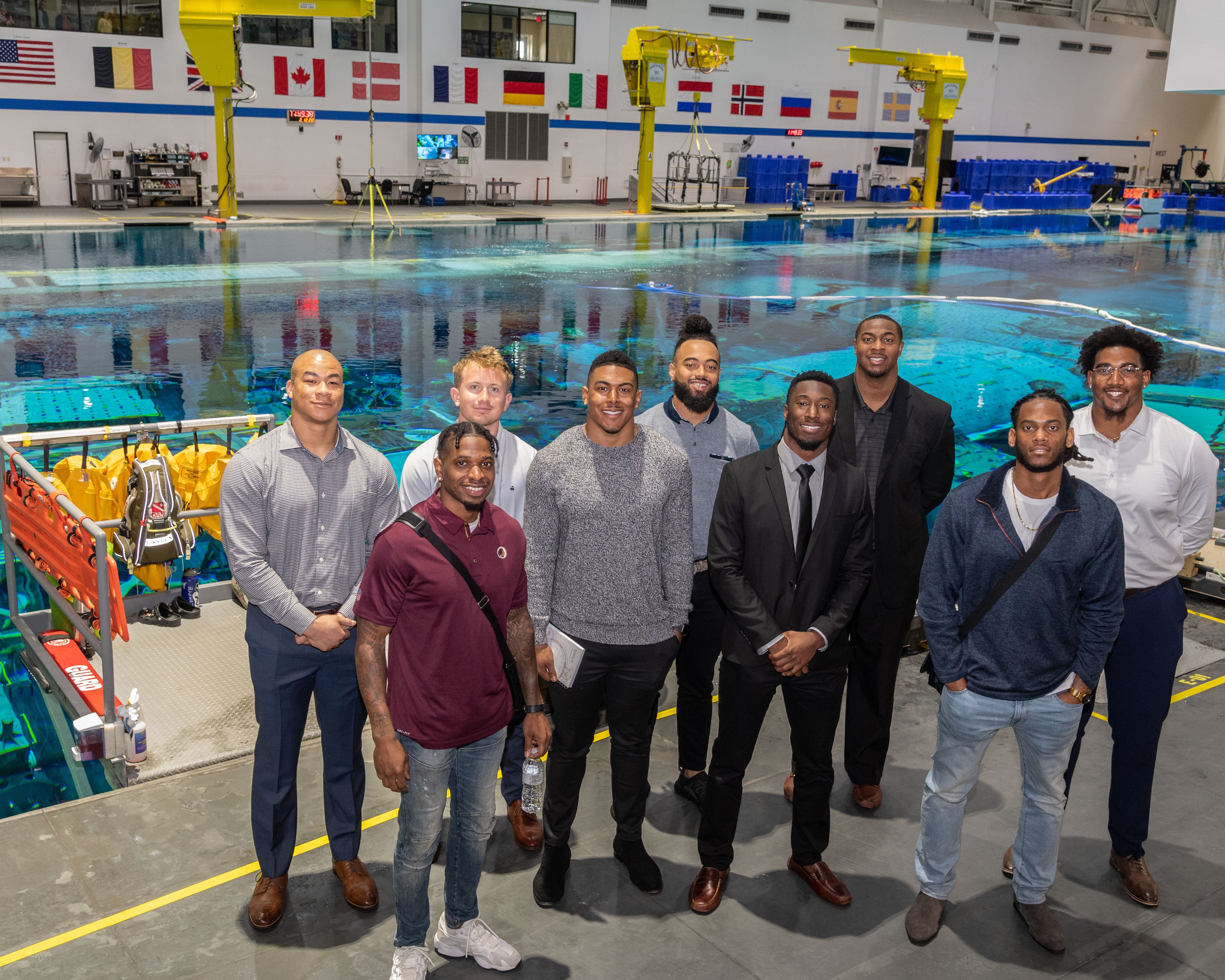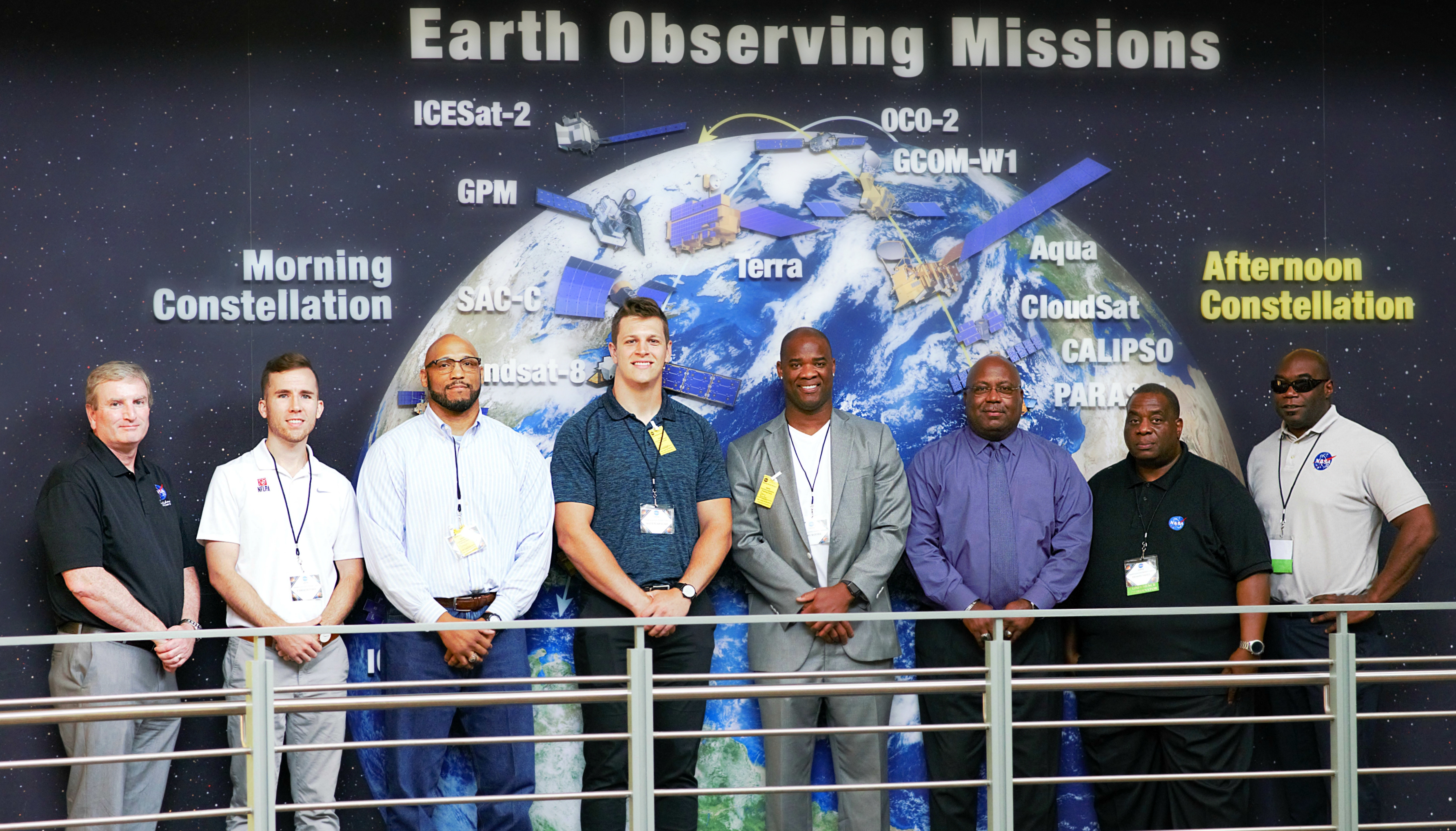
Attendees of the second NASA Commercialization Training Camp toured facilities at NASA’s Johnson Space Center in Houston, Texas. Cohort members included Aaron Wallace (back row, far left) and William Sweet (back row, second from right). Photo credit: NASA/Bill Stafford

Attendees of the first NASA Commercialization Training Camp gather at NASA’s Goddard Space Flight Center in Greenbelt, Maryland. Cohort members included Joe Wesley (third from left) and Gary Baxter (fourth from right). Photo credit: NASA/Samantha Kilgore
As preparations take place for the first all-virtual training camp in March, the NASA Technology Transfer Program checked in with four graduates from 2019 and 2020 to see how they’re using the knowledge they gained in pursuit of their entrepreneurial goals.
Gary Baxter, Retired Cornerback/Safety for Baltimore Ravens and Cleveland Browns
With a passion for health and human sciences, Gary Baxter found a way to explore his interest in sports science research. When Baxter attended the NASA Commercialization Training Camp in 2019, he sought technologies with potential to improve human health and livelihood.
“I’m confident that American ingenuity is among the best in the world,” Baxter said. “As an entrepreneur, it’s awesome to think about how I can take a NASA innovation and use it to help people.”
Baxter has been involved in business since 2008, when he began a career in commercial real estate. In addition to playing for the Baltimore Ravens and Cleveland Browns, Baxter has completed multiple internships, studied business management and operations, and served as a board member on an assortment of government and nonprofit boards.
Following Baxter’s experience with the first training camp, he enrolled in the NASA Startup Studio, which is run by FedTech, an organization that specializes in connecting entrepreneurs with technologies from federal labs. Baxter and his team studied a NASA technology with potential in the health and wellness industry, assessing its commercial potential and evaluating whether or not a customer base exists.
Now, Baxter is working with potential business partners to determine if licensing the technology and pursuing commercialization can become a reality.
“I’m excited to continue working with NASA, and the training camp was very helpful in getting me to this point,” Baxter said.
William Sweet, Offensive Lineman for Dallas Cowboys
As someone who likes a challenge, William Sweet attended the FedTech program while also participating in an NFL training camp. While juggling these two time-intensive pursuits, he met a business partner and refined his idea for a product based on a NASA technology. Earlier, Sweet was an attendee of the February 2020 NASA Commercialization Training Camp.
“One of my biggest takeaways from NASA’s program is that there are so many technologies that NASA engineers have designed for space, and there are just as many use cases for those technologies to be applied here on Earth,” Sweet said.
His interest focuses on renewable energy, with an eye to the future.
“It’s very important that we find alternatives today to survive tomorrow,” Sweet said.
During Sweet’s FedTech experience, he met fellow entrepreneur Brittany Corsi. Together, they’re working to investigate innovations related to solar and renewable energy. Sweet founded his own investment company in 2019, and through that experience, he decided to continue exploring the realm of entrepreneurship. He’s also a venture partner with Fox Ventures, based in Champaign, Illinois.
Though their ideas are still in early stages, Sweet said he and Corsi are interested in imagining how renewable energy will change people’s homes and day-to-day lives.
“As the technologies continue to develop and evolve, our homes should reflect that,” Sweet said. “At the end of the day, we want to help people save money and be more efficient.”
Aaron Wallace, Retired Player for Tennessee Titans and Denver Broncos
Aaron Wallace was newly retired when he first heard about the NASA Commercialization Training Camp.
“Entrepreneurship was definitely something I was interested in,” Wallace said. “The training camp made it easier for me to connect with people and network with other entrepreneurs.”
Wallace attended the training camp in February 2020, and in the following months, he participated in FedTech, where he studied an air filter technology developed at NASA’s Glenn Research Center in Cleveland, Ohio. The multistage air filter, designed for the International Space Station, could have applications in HVAC systems for schools and commercial buildings.
At FedTech, Wallace worked with a team to study the technology’s value proposition and conduct customer discovery, speaking with potential clients to assess interest. During the research process, Wallace and his team received feedback from building managers, construction, professionals and HVAC technicians, who helped them better conceptualize their product. Based on his experiences at NASA and in FedTech, Wallace has decided to pursue a license for the technology. His company, Onedrus, will focus on air quality solutions to reduce the amount of maintenance that air filtration systems require.
“The training camp was a great resource for someone going through a career transition,” Wallace said. “When you retire, it can be difficult to figure out where you want to go next, and I feel that the training camp is where my career transition started.”
Joe Wesley, Retired Player for Jacksonville Jaguars
“I’ve always been entrepreneurial and business-minded,” said Joe Wesley, who attended the June 2019 training camp at NASA’s Goddard Space Flight Center in Greenbelt, Maryland.
Wesley also spoke at the February 2020 training camp at NASA Johnson and participated in the 2020 NASA Startup Studio. Now, Wesley has teamed up with former NASA physicist Erica Morgan-West to license a NASA technology developed at NASA’s Ames Research Center in Mountain View, California. Their company, ResQ Biometrics, plans to develop a product called Heartbeat ID that can detect an individual’s unique biometric cardiac signature.
“It opens up the capability to identify persons of interest or missing persons without requiring the person to wear a device,” Wesley said. “We hope this technology can help locate individuals who have been caught up in human trafficking, or people with dementia who have gone missing.”
Wesley said that Heartbeat ID has potential customers in the medical and security industries. Wesley licensed the technology in spring of 2020, and currently, Wesley and Morgan-West are seeking grants to help move the technology forward.
“It’s been great working with NASA,” Wesley said. “I’ve definitely used what I’ve learned beyond the week of the program itself.”


